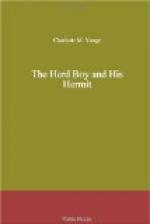Search for prisoners being over at Barnet, Hal was removed to the guest chamber of his hosts, where he lay in a huge square bed, and in the better air began to recover, understand what was going on round him, and be anxious for his friends, especially Sir Giles Musgrave and Simon Bunce. The ladies still attended to him, as Lorimer pronounced the journey to be absolutely unsafe, while so many soldiers disbanded, or on their way to the Queen’s army, were roaming about, and the Burgundians brought by Edward might not be respectful to an English Prioress. It was safer to wait for tidings from Lord St. John, which were certain to come either from Bletso or the Minoresses’.
So May had begun when Lorimer hurried home with the tidings that a messenger had come in haste from King Edward from the battlefield of Tewkesbury, with the tidings of a complete victory. Prince Edward, the fair and spirited hope of Lancaster, was slain, Somerset and his friends had taken sanctuary in the Abbey Church, Queen Margaret and the young wife of the prince in a small convent, and beyond all had been flight and slaughter.
For a few days no more was known, but then came fuller and sadder tidings. The young prince had been brutally slain by his cousins, Edward, George, and Richard, excited as they were to tiger-like ferocity by the late revolt. The nobles in the sanctuary, who had for one night been protected by a cord drawn in front of them by a priest, had in the morning been dragged out and beheaded. Among them was Anne’s father, Lord St. John of Bletso, and on the field the heralds had recognised the corpse of her suitor, Lord Redgrave. To expect that Anne felt any acute sorrow for a father whom she had never seen since she was six years old, and who then had never seemed to care for her, was not possible.
And what was to be her fate? Her young brother, the heir of Bletso, was in Flanders with his foreign mother, and she knew not what might be her own claims through her own mother, though the Prioress and Master Lorimer knew that it could be ascertained through the seneschal at Bletso, if he had not perished with his lord, or the agents at York through whom Anne’s pension had been paid. If she were an heiress, she would become a ward of the Crown, a dreary prospect, for it meant to be disposed of to some unknown minion of the Court.
CHAPTER XXII. THE NUT-BROWN MAID
All my wellfare to trouble and care
Should change if you were gone,
For in my mynde, of all mankind
I love but you alone.—Nut-brown
maid.
Anne St. John, in her ‘doul’ or deep mourning, sat by Hal’s couch or daybed in tears, as he lay in the deep bay of the mullioned window, and told him of the consultation that had been held.
‘Ah, dear lady!’ he said, ’now am I grieved that I have not mine own to endow you with! Well would I remain the landless shepherd were it not for you.’




